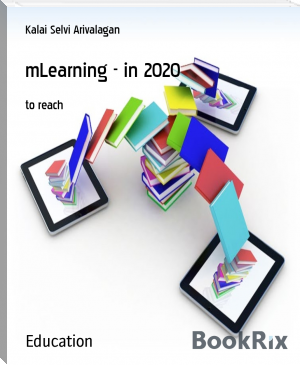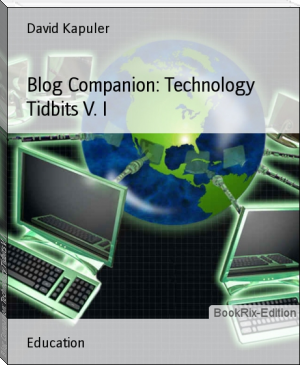INNOVATIONS IN SCIENCE, TECHNOLOGY AND MATHEMATICS EDUCATION IN NIGERIA - Ebele C. Okigbo, Nneka R. Nnorom, Ernest O. Onwukwe (best novel books to read TXT) 📗

- Author: Ebele C. Okigbo, Nneka R. Nnorom, Ernest O. Onwukwe
Book online «INNOVATIONS IN SCIENCE, TECHNOLOGY AND MATHEMATICS EDUCATION IN NIGERIA - Ebele C. Okigbo, Nneka R. Nnorom, Ernest O. Onwukwe (best novel books to read TXT) 📗». Author Ebele C. Okigbo, Nneka R. Nnorom, Ernest O. Onwukwe
Nigeria is a developing nation, therefore improving Science Education should be a priority in other to promote her long-terms economic development (World Bank, 1997). Towards enhancing or promoting a qualitative Science Education for sustainable national development in a holistic context in Nigeria, several initiatives had been taken and policies formulated. These included; partnership with some Non-Governmental Organizations (NGOs), seeking foreign aids and so on, which have positively resulted into equipping schools with science gadgets, training and retraining of science educators, and so on. However, at different seminars, workshops and conferences organized in respect of Science Education scholars have articulated that by enhancing of Science Education, teaching and learning could be guaranteed and sustained. Hence, education is a continuum and life-long process (Ololube, 2006b) corroborated by Abraham, (2014) maintains that Life-Long Learning is the type of education that starts from cradle to the grave. World Bank (1997) emphasis it as a global approach to education.
Education and Politics
Over the past decade, Nigeria has been plagued by frequent political unrest. This political instability has generated negative effects on the education system. Although education had been in crisis for many years, the situation has recently been made worse by frequent strikes staged by students, faculty and teachers. Much of the difficulty lies in the fact that the sector is poorly funded. These results in shortages of material and human resources for education: lack of qualified teachers; a brain drain from the public sector; few instructional inputs, shortage of classrooms, and a host of other problems. These difficulties have been most pronounced at the foundation levels of education (Imhanlahimi, 1993; Gardner, 1994). Both primary and secondary school levels have been negatively affected. In 1997 the Federal Minister of Education, following a nation-wide tour of the schools, stated that the basic infrastructure in schools such as classrooms, laboratories, workshops, sporting facilities, equipment, libraries were in a state of total decay. The physical condition of most schools was reported to be pathetic.
Nigeria as a reconstituted democracy has to address issues of a dual transformation. The country needs to re-examine its past and focus on development plans that will meet the challenges of the future. The need to work out a new developmental plan puts pressure on the political, social and economic sectors of the country. The new government has declared education as one of its priorities (Ololube, 2013). The goal is to have a reformed system of education that will provide access at all levels of education and to improve the quality and efficiency of the entire education system. While these are lofty goals, the real challenge will lie in the successful implementation of them. Education has been at the top of the priority lists of some previous Nigerian governments yet the education system is still far from being ready for the challenges of the new century. Nigeria is not the only country whose education system is unprepared. A closer examination of many systems, especially in a developing context, indicate that most of the educational systems in developing countries are not yet ready to prepare students for the contemporary global world (Mckeonth, 2002). The education needs of an emergent Nigeria are well articulated by Alebiosu and Ifamuyiwwa 2008 when they suggests that Nigerian education should be marked by a continuous search for excellence supported by the political will for good governance and transparency.
Revised National Policy on Education
Nigeria’s “National Policy on Education,” published in 1977 was revised in 1981 and 1990. The policy document has been revised to ensure that the policies address the perceived needs of the government in power and to try to ensure that the education sector is supportive of government development goals. Following recent political changes, which saw the reintroduction of democracy in the country, the government acknowledged the need to revise and update the National Policy on Education once more to ensure that the education system meets the needs of a new democracy.
The entire education system would benefit from coherent national policy development rather than piecemeal reforms. The revision of educational policies is being considered as a long-term goal, due to other pressing needs. The discussion of new policies would benefit from careful attention to the recommendations made and adopted at international meetings hosted by UNESCO and other donors for the various sectors of education (Abraham, 2014). New policies have to address the needs of a new democracy, its role in the new global order, while reflecting the realities of Nigeria’s economy. The new democratic government has already demonstrated its political will in working to rebuild the Nigerian economy. It is quite clear that the challenges the country will face if it is to reform the education system will include financial constraints, the need for new expertise, and a broad range of technical assistance. In addition it must be recognized that funding needs for education compete with a range of other critical needs in health, public safety, and social welfare. This presents enormous challenges for the new government and to the donor community.
Roles of Science Education in National Development in Nigeria
Science education deals with sharing of science content and process with individuals who are not considered traditionally to be member of the scientific community; the individuals could be students, farmers, market women or a whole community (Ololube, 2013). Science education in Nigeria concentrates on the teaching of science concepts, method of teaching and addressing misconceptions held by learners regarding science concepts. Science education is very important to the development of any nation that is why every nation must take it very serious in all institutions of learning. Many of the developed worlds were able to achieve so much in science and technology because of science education. Launching of sputnik by the Russian government in October, 4 1957 would not have been possible if not for the position they placed physics in science education (Kola, 2003). Science education comprises three subjects namely biology, chemistry and physics which are combined with education, Over the years there has been low enrolment of these courses in our institutions (Abdullahi 2015);causes of this low enrolment include society disdain, mockery of teacher and low prestige of teachers.
Interestingly, when talking about national development, it is a concept that is all embracing. Hence, it cuts across several sectors of nation. It should also be understood that, Nigeria is yet to attain an impressive level in terms of development despite the abundant natural and human resources available in the country. Tolu and Abe (2011) maintain that the pride of any government is the attainment of higher value level of development in such a way that her citizens could derive natural attachment to governance. Ololube (2006a) maintains that development as an idea that embodies all attempts to improve the conditions of human existence in all ramifications. Naomi (1995) believes that development usually involving not only economic growth, but equitable distribution, provision of health care, education, housing and other essential services all with a view to improve the individuals and collective quality of life. Therefore, national development can be explained as the ability of a country or countries to improve the social welfare of the people by providing social amenities like; quality education, portable water, transportation, transportation infrastructure, Medicare and so on.
Standard of Science Education in Nigeria
The standards for science education provide expectations for the development of understanding for students through the entire course of their education and beyond. The traditional subjects included in the standards are physical, life, earth, space, and human sciences. Alebiosu and Ifamuyiwa (2008) submit that Science Education plays a vital role in the lives of individuals and development of a nation, scientifically and technologically. Kola (2013) also observes that Science Education is very important to the development of any nation and that is why, every nation must take it very serious in all their institutions of learning. It was further stressed that the development in science and technology among the developed nations is due to focus and rapt attention given to qualitative Science Education. Hence, every nation, including Nigeria is therefore striving to ensure that Science Education is developed. Science Education is an amalgamation or fusion of three science subjects, namely; Biology, Chemistry, Physics which are combined with education. It is also on recognition of the roles of Science Education to sustainable national development that government initiated policies with respects to it teaching at all levels of education as documented in the National Policy of Education (2004) which contains the following, as reported by Kola (2003);
1. At the primary level Science Education must be introduced and taught by the specialist teachers and practical, explanatory and experimental methods should be used while teaching.
2. At the secondary level, Science Education should be taught, while English, Mathematics and Biology are made compulsory for all students.
3. At the tertiary level, more human and non-human resources are devoted to the teaching of Science and Technology Education.
4. Admission into the science and business courses would be weighted in the nation of 70:30 in favour of the science courses.
5. The establishment of science based institutions, such as, Polytechnics, Monotechnics and special centres. All these are stated in the National Policy of Education (2004) in Nigeria.
The declining standard of the Nigeria educational system should trouble the mind of any well-meaning Nigerian, because, Education is the bedrock of development. But unfortunately, a lot of problems bedevil the education system in Nigeria. Poor funding from the government leading to lack of educational infrastructure, lack of quality teachers, inadequate classrooms and teaching aids like Computers, Laboratories and libraries, coupled with numerous social vices like malpractice, cultism and corruption all contribute to the sorry state of the Nigeria educational system. If Nigeria must move forward into the age of technological and scientific dependence, government and the contributing private sector must begin to pay full attention to solving the myriads of problems surrounding the educational system in Nigeria. Below are a few solutions to the falling educational standard in Nigeria
Conclusion
Any analysis of the Nigerian education sector is particularly challenging due to the lack of adequate data. Most of the literature available only provides information up to the mid-nineties. Data available was primarily for the eighties or early nineties. The last reporting date on record for Nigeria in the 1999 UNESCO Statistical Yearbook and the 1999 World Data on Education (produced by the International Bureau of Education) was for 1994 in contrast to most other countries (World Bank, 1997). In some instances where data were available, they were outdated. It is critical that measures be taken to update and streamline data collection, analysis and presentation in order to provide reliable data for strategic planning, public policy formulation and system performance monitoring, and to assess what changes are needed as part of reforming and improving the science education system. A number of significant changes have already been proposed for the education system.
There seems to have been a shift in the education system to emphasize practical applications of knowledge necessary for future employment and skills development for self-employment. There





Comments (0)